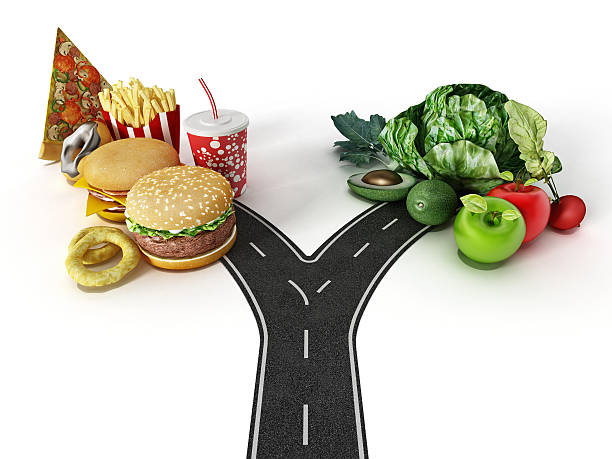Table of Contents
1. What is a Diet?

In today’s society, the term “diet” is frequently associated with weight loss. However, a diet is much more than just a temporary solution for shedding pounds; it encompasses the overall dietary patterns that individuals follow, impacting their health, energy levels, and even emotional well-being. A diet is essentially a set of guidelines that dictate which foods to eat, how much of them, and when to consume them, with the goal of achieving specific health outcomes. These outcomes can range from weight loss and muscle gain to improving heart health, boosting cognitive function, and managing chronic diseases like diabetes or hypertension.
One of the biggest misconceptions about dieting is that it has to involve deprivation or severe restriction. While many diets, especially fad diets, promote a drastic reduction in calories or cutting out entire food groups, this approach often leads to short-term success followed by long-term failure. A successful diet is one that not only helps you reach your goals but is also sustainable and supports long-term health. In essence, a diet isn’t just something you do for a few months to reach a certain weight or health milestone; it’s a lifestyle.
In recent years, as more research has highlighted the relationship between food and overall health, many individuals have turned to structured diets to optimize their well-being. While some pursue these diets with the goal of losing weight, others seek to improve mental clarity, boost physical energy, or even reduce the risk of chronic diseases. However, with the overwhelming number of dietary options available today, choosing the right one can be daunting.
In this article, we’ll dive deep into some of the most popular diets currently in practice, breaking down their benefits, potential drawbacks, and considerations for choosing the right plan tailored to your personal needs.
2. Popular Diets Today

While many diets exist, a few stand out due to their popularity and the benefits that research and anecdotal evidence suggest they provide. Below, we will explore several of the most common diets, how they work, and whether they might be right for you.
Ketogenic Diet (Keto)
The ketogenic diet, often referred to simply as “Keto,” has gained significant popularity in recent years. The fundamental principle of the Keto diet is to drastically reduce carbohydrate intake and replace it with fats. By doing so, the body enters a metabolic state called “ketosis,” where it becomes highly efficient at burning fat for energy.
In a standard diet, the body primarily uses glucose (derived from carbohydrates) for energy. However, when carbohydrate intake is minimized to about 5-10% of total calories, the body is forced to switch its energy source to fat. In ketosis, the liver converts fat into fatty acids and ketones, which become the primary fuel for the body, including the brain.
- Benefits of the Keto Diet:
- Rapid Weight Loss: Since the body relies on stored fat for energy, many people experience quick and significant weight loss, especially during the first few weeks.
- Improved Mental Clarity: Many keto dieters report enhanced cognitive function and better mental clarity. Ketones are believed to be a more stable source of energy for the brain compared to glucose, reducing fluctuations in mental focus.
- Sustained Energy Levels: Without the rollercoaster of blood sugar spikes and crashes from consuming carbohydrates, keto dieters often feel more energized throughout the day.
- Challenges of the Keto Diet:
- Keto Flu: When transitioning into ketosis, many people experience flu-like symptoms, including headaches, fatigue, nausea, and irritability. This “keto flu” occurs as the body adapts to using fat for fuel instead of carbohydrates.
- Nutrient Deficiency: The strict limitation of carbs means that many fruits, vegetables, and grains are restricted. This can lead to deficiencies in key nutrients like fiber, vitamins, and minerals if not carefully managed.
- Social Challenges: Since the keto diet restricts many common foods, it can be difficult to maintain in social settings, such as dining out or attending family gatherings.
While keto can be highly effective for weight loss, it requires strict adherence and may not be suitable for everyone, particularly those with underlying medical conditions like diabetes or cardiovascular disease. Before starting this diet, it is essential to consult a healthcare professional to ensure it’s appropriate for your specific needs.
Low-Carb Diet
A less restrictive alternative to the ketogenic diet is the Low-Carb diet. As its name suggests, this diet reduces carbohydrate intake but does not aim to push the body into ketosis. Typically, a low-carb diet restricts carbohydrate consumption to around 100-150 grams per day, though this can vary depending on individual needs and goals.
- How It Works:
- A low-carb diet shifts the focus away from carbs, encouraging individuals to eat more protein and healthy fats. By reducing carb intake, the body burns through its glucose stores more slowly, relying more on fat stores for energy. However, since carbs aren’t as drastically reduced as in Keto, the body still relies on glucose as its primary fuel source.
- Benefits of Low-Carb Diet:
- Moderate Weight Loss: Many studies show that low-carb diets are effective for weight loss, particularly for people who are overweight or have insulin resistance.
- Better Blood Sugar Control: For people with type 2 diabetes or prediabetes, reducing carb intake helps stabilize blood sugar levels and reduces the need for insulin or other medications.
- Easier to Maintain than Keto: Because the Low-Carb diet is less restrictive than Keto, many people find it easier to maintain long-term while still reaping the benefits of reduced carb consumption.
- Challenges of the Low-Carb Diet:
- Potential Nutrient Imbalance: As with any diet that restricts certain food groups, there is a risk of missing out on essential nutrients. However, a balanced Low-Carb diet that includes vegetables, healthy fats, and protein can minimize this risk.
- Cravings for Carbs: Carbs are a significant source of pleasure for many people, and reducing them can lead to cravings. Overcoming these cravings is often one of the most challenging aspects of following a Low-Carb diet.
Low-Carb diets are a more moderate approach to cutting carbohydrates, making them easier to follow long-term compared to Keto. However, it still requires mindfulness about food choices to ensure nutritional balance.
Vegetarian and Vegan Diets
Vegetarianism and veganism have become increasingly popular, not only for their health benefits but also for ethical and environmental reasons. While a vegetarian diet excludes meat, a vegan diet excludes all animal products, including dairy, eggs, and sometimes even honey.
- Benefits of Vegetarian/Vegan Diets:
- Heart Health: Plant-based diets are naturally lower in saturated fat and cholesterol, which can improve heart health and reduce the risk of cardiovascular disease. Several studies have shown that vegetarians and vegans tend to have lower blood pressure and cholesterol levels.
- Weight Management: Many people who follow vegetarian or vegan diets tend to have lower body mass indexes (BMI) compared to meat-eaters. This is likely due to the high fiber content of plant-based foods, which keeps people feeling full and satisfied without overeating.
- Environmental Impact: A major driving force for many people choosing a vegetarian or vegan diet is the reduced environmental impact. Animal agriculture is a leading cause of deforestation, water use, and greenhouse gas emissions. By reducing or eliminating animal products from the diet, individuals can significantly reduce their carbon footprint.
- Challenges of Vegetarian/Vegan Diets:
- Nutrient Deficiencies: One of the most common concerns with plant-based diets is the potential for deficiencies in essential nutrients like vitamin B12, iron, calcium, and omega-3 fatty acids. These nutrients are primarily found in animal products, so vegetarians and vegans need to carefully plan their diets or take supplements to avoid deficiencies.
- Protein Intake: While it’s entirely possible to get enough protein on a vegetarian or vegan diet, it requires more planning than diets that include meat. Protein-rich plant-based foods such as legumes, tofu, and quinoa need to be consumed in sufficient quantities to meet daily protein needs.
- Social Situations: Eating out or attending social events can be challenging for vegetarians and vegans, as many restaurants or social gatherings may not offer suitable food options.
For those who prioritize health, environmental sustainability, or animal welfare, a vegetarian or vegan diet can be a powerful choice. However, it requires careful planning to ensure nutritional adequacy.
Mediterranean Diet
The Mediterranean Diet is widely regarded as one of the healthiest diets in the world. It is based on the traditional eating patterns of people living in countries bordering the Mediterranean Sea, such as Greece, Italy, and Spain. The Mediterranean Diet emphasizes whole foods, including plenty of fruits, vegetables, whole grains, nuts, seeds, and olive oil. It also includes moderate consumption of fish and poultry, with minimal red meat and processed foods.
- Benefits of the Mediterranean Diet:
- Heart Health: The Mediterranean Diet is renowned for its heart-healthy benefits. The emphasis on healthy fats from olive oil, nuts, and fish helps reduce bad cholesterol levels (LDL) while increasing good cholesterol (HDL). This diet has been shown to significantly reduce the risk of heart disease and stroke.
- Longevity: Many studies have linked the Mediterranean Diet to increased life expectancy and reduced risk of chronic diseases such as Alzheimer’s and cancer.
- Weight Management: The Mediterranean Diet’s focus on whole foods, particularly fiber-rich vegetables and grains, helps control appetite and maintain a healthy weight.
- Challenges of the Mediterranean Diet:
- Access to Fresh Ingredients: The Mediterranean Diet relies heavily on fresh, whole foods, which can be challenging for people in areas where fresh produce or seafood is not readily available or affordable.
- Preparation Time: While the Mediterranean Diet is delicious and nutritious, it often requires more time for meal preparation compared to diets that allow for more processed foods. This can be a hurdle for individuals with busy schedules.
Overall, the Mediterranean Diet is highly praised for its balance, nutritional richness, and ability to promote long-term health. It is often recommended by doctors and nutritionists for individuals looking to improve heart health and longevity.
3. Benefits of Following a Diet

The benefits of following a structured diet go beyond just weight loss. When done correctly, a diet can enhance overall health, boost mental and physical performance, and contribute to long-term well-being.
Enhanced Overall Health
A well-balanced diet rich in essential nutrients supports all of the body’s functions, from brain health to immune function. Following a diet that prioritizes whole foods and minimizes processed foods can lead to improved cardiovascular health, better digestive health, and a reduced risk of chronic diseases like type 2 diabetes and certain cancers.
For example, the Mediterranean Diet is specifically known for its heart-protective properties, while plant-based diets may reduce the risk of various chronic illnesses. Diets that focus on reducing sugar and refined carbohydrates can also prevent insulin resistance, a precursor to diabetes.
Effective Weight Management
Many people turn to diets primarily for weight management. When combined with physical activity, a balanced diet can help you lose weight and keep it off. One of the main benefits of dieting is learning how to eat mindfully and understanding portion control. By focusing on nutrient-dense foods, such as fruits, vegetables, whole grains, and lean proteins, individuals can reach and maintain a healthy weight.
For instance, both the Keto and Low-Carb diets can effectively promote fat loss, especially in the abdominal region, which is associated with many health risks. Meanwhile, plant-based diets help reduce calorie intake due to their high fiber content, making weight management easier without the need for strict calorie counting.
Boosted Mental Clarity and Energy Levels
Food is fuel for the body, and the quality of that fuel has a direct impact on mental clarity and energy levels. Diets that emphasize healthy fats (like the Mediterranean Diet and Keto) provide the brain with a steady supply of energy, helping to avoid the mental fog that often accompanies high-sugar, high-carb diets.
Additionally, diets that focus on anti-inflammatory foods, such as fish, leafy greens, and nuts, have been linked to improved mood and reduced symptoms of depression and anxiety. This is particularly relevant in today’s world, where mental health challenges are on the rise, and dietary intervention may provide a natural method of managing these issues.
4. How to Choose the Right Diet

Choosing the right diet requires thoughtful consideration of your health goals, current health status, and lifestyle. What works for one person may not necessarily work for another, so it’s essential to find a diet that aligns with your personal preferences and needs.
Identify Personal Goals
Before starting any diet, you need to clearly define your goals. Are you looking to lose weight, increase muscle mass, improve your heart health, or boost your energy levels? Your specific objectives will guide your choice of diet.
For example:
- Weight loss: Consider diets like Keto, Low-Carb, or even intermittent fasting, which have been shown to promote fat loss.
- Muscle gain: A high-protein diet combined with strength training might be the best option.
- Cardiovascular health: The Mediterranean Diet is a top choice for promoting heart health and longevity.
Consider Your Lifestyle
It’s also essential to choose a diet that fits your lifestyle. If you’re someone who enjoys cooking and experimenting in the kitchen, a diet like the Mediterranean Diet, which emphasizes fresh, home-cooked meals, may be a great fit. On the other hand, if you’re always on the go and need something more flexible, a Low-Carb diet that doesn’t require strict meal planning might be better.
Listen to Your Body
Once you’ve chosen a diet, it’s important to pay attention to how your body responds. Do you feel more energetic? Are you losing weight or meeting your health goals? If not, you may need to adjust your approach or try a different diet. Dieting is not a one-size-fits-all endeavor, and it’s crucial to be flexible and make adjustments based on your body’s signals.
5. Common Mistakes When Following a Diet

Even with the best of intentions, many people make mistakes when starting a new diet. Avoiding these common pitfalls can make the difference between success and frustration.
Unrealistic Expectations
Many people expect rapid results from dieting, but sustainable weight loss and health improvements take time. If you set unrealistic goals, such as losing 10 pounds in a week, you’re likely setting yourself up for disappointment. Instead, aim for gradual progress and focus on long-term success rather than short-term fixes.
Restrictive Dieting
Extreme restriction, such as cutting out entire food groups or drastically reducing calories, can lead to feelings of deprivation, which often results in binge eating. Instead of focusing on what you can’t eat, shift your mindset to what you can enjoy and prioritize adding healthy foods to your diet.
Failing to Plan
Without proper meal planning, it’s easy to fall back into old habits. If your diet requires meal preparation, take the time to organize your meals ahead of time to avoid making unhealthy choices when you’re pressed for time.
6. Tips for Maintaining a Diet Long-Term

While starting a diet is often the easiest part, sticking to it long-term can be more challenging. Here are some tips to help you maintain your diet over time.
Focus on Sustainability
The key to long-term dietary success is finding a plan that you can stick with for the rest of your life, not just for a few weeks or months. This means choosing a diet that allows for occasional indulgences and doesn’t feel overly restrictive. A sustainable diet is one that can become a natural part of your lifestyle, rather than something you’re constantly fighting against.
Practice Mindful Eating
Mindful eating is the practice of being fully present while eating and paying attention to the taste, texture, and feelings of fullness. This practice helps you become more in tune with your body’s hunger cues and can prevent overeating. Mindful eating also encourages a more enjoyable relationship with food, making it easier to stick to a healthy diet.
Stay Flexible
Life is unpredictable, and there will be times when sticking to your diet becomes challenging. Whether it’s a holiday, vacation, or special occasion, don’t stress about being perfect all the time. Allow yourself to enjoy these moments without guilt, and simply get back on track afterward.
7. Conclusion
Diets are not just about weight loss—they’re a pathway to overall health, well-being, and long-term vitality. Whether you’re looking to lose weight, improve heart health, or boost mental clarity, there is likely a diet that fits your needs. However, the key to success is finding a diet that aligns with your goals, fits your lifestyle, and is sustainable in the long run.
From Keto to the Mediterranean Diet, each approach has its unique benefits and challenges. The most important thing is to choose a diet that you can stick with, nourish your body with healthy foods, and adjust based on your needs.
In the end, the right diet is the one that helps you feel your best, supports your health, and fits seamlessly into your life. By making informed choices, listening to your body, and staying consistent, you can achieve your health goals and enjoy a healthier, happier life.
